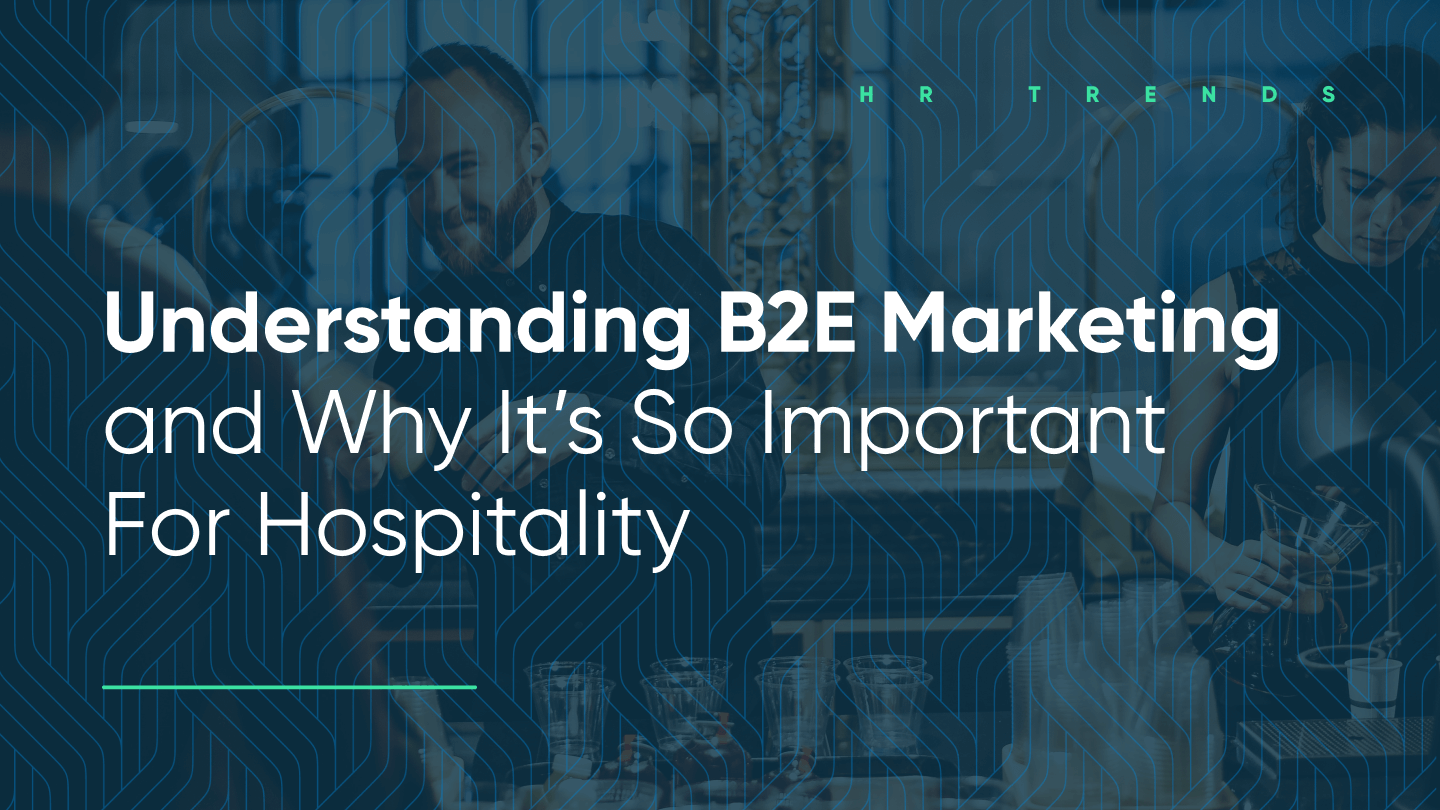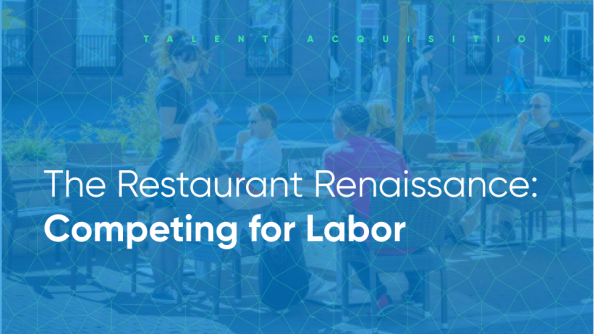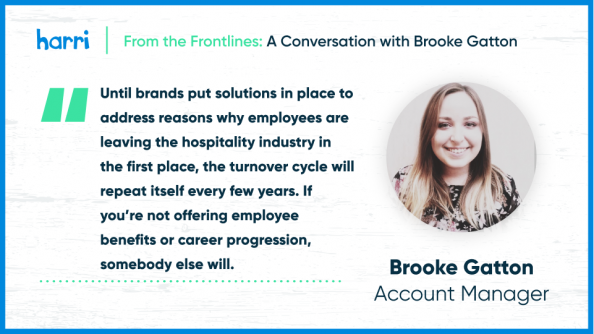Understanding B2E Marketing and Why It’s So Important For Hospitality

- By Harri Insider Team | January 13, 2021
Hospitality is no stranger to B2B (business-to-business) and B2C (business-to-consumer) marketing strategies. They empower brands to achieve operational excellence and better serve customers. In light of the pandemic, a new marketing strategy is taking the spotlight in hospitality: B2E marketing, or business-to-employee marketing.
You may or may not have heard of B2E strategies, but be aware: it’s just as, if not more, important than B2B or B2C marketing, especially for hospitality businesses seeking to inject value into their internal operations.
So what exactly is B2E marketing? Business-to-employee marketing centers around two core concepts. First is the focus on attracting high-quality employees; second is the focus on engaging and retaining said high-quality employees.
Just as you would market a new menu item towards your customers, B2E marketing focuses on current and prospective employees. It means creating a stellar workplace to support your existing team and amping up the pre-hiring stages to effectively attract loyal, high-quality candidates that fit your business’ unique needs.
Major brands across hospitality are shifting towards a B2E focus, shining a spotlight on employees that make their day-to-day operations possible.
Why is B2E marketing important for hospitality businesses?
Hospitality has always suffered from a talent crisis largely in part due to the high turnover rates associated with the industry. That creates direct and indirect expenses that can have an exponentially negative impact on a business’ bottom line, such as rehiring, training, and inadequate knowledge or skill transfers.
With a consistent B2E strategy, restaurant operators can avoid poor employee experiences that result in costly turnover by focusing on retaining those top-performing team members.
Loyal employees are incredibly valuable and are the heart and lifeblood of a successful business. They know your restaurant inside and out, are in a better position to upsell, and open the possibility to internal growth paths rather than risking new hires. As such, management needs to make it crystal clear that their team members are cared for, respected, and appreciated, especially in today’s turbulent COVID world.
The result? A more humanistic approach to operations management that boosts business performance from the bottom up by empowering your most important asset — your people.
How can I engage in thoughtful B2E marketing?
If you’re not nurturing relationships with your employees, chances are they’ll leave for a company that does. But people can detect non-authentic efforts, which means you can’t dive into a B2E strategy without conducting proper research.
Restaurant operators should first start by identifying employee needs and pain points. Successful B2E efforts begin with a solid understanding of your team’s core concerns.
The top employee stressors in hospitality that result in turnover relate to:
- Scheduling dissatisfaction
- A poor relationship with their manager
- Misaligned culture fit
Talk to your front-line employees, ask managers for feedback, or send out anonymous surveys. Once you’ve got a grip on areas of improvement, the next step is executing B2E strategies.
No two employee experiences are the same, and the most successful B2E marketing techniques dive deep to create highly personalized, engaging employee experiences. But when managers already have so much on their plates or restaurant operators oversee hundreds of thousands of employees, taking that first step can seem overwhelming.
However, modern HCM and WFM technology enable highly targeted B2E strategies to ensure optimal people performance at scale without adding administrative burdens to your teams’ workloads.
Mindful scheduling
Schedules are highly important to service-based employees and are arguably one of the most important pieces of a successful B2E strategy.
For front-line employees, a schedule is the framework for planning daily commutes, childcare, and other important life activities. That’s the reason why predictive scheduling laws like Fair Workweek are being implemented across the US. It’s also the leading cause of employee turnover in hospitality.
But creating labor-complaint schedules that fit your team’s preferences is no easy task, especially when you stop to consider the typical service demands of each day.
HCM software, like Harri, uses intelligent scheduling that takes all of the above, and more, into account. And, because these tools rely on historic performance and service demand data, creating effective schedules becomes easier and easier, allowing managers more time to focus on other operational challenges. Employee-driven shift swaps can occur without managerial intervention, creating a truly streamlined scheduling ecosystem.
Consider the impact of intelligent scheduling. Not only are your front-line workers more likely to be satisfied with their schedule assignments, but managers are saved from the headache of navigating the complex puzzle that is the employee schedule. Built-in compliance consideration means those managers won’t need to fret about potential labor law violations, and labor law-driven schedules naturally lend themselves to happier employees.
That all translates into increased retention across the board. If you want to begin a B2E marketing strategy that ripples across your entire business, we recommend starting at the schedule.
Meaningful communications
Effective communication is the heart of successful B2E marketing, but managers often overlook the potential of two-way communication channels.
In its most basic form, technology can (and already is) used to communicate things like schedule changes or shift swaps with far greater efficiency than pen-and-paper methods. However, successful communications for large teams extends far beyond that by building company-wide trust and driving team members to meet and exceed performance expectations, making it an essential B2E channel to focus on.
Effective team communications can extend into many different operational buckets, such as:
- Monthly, company-wide updates on the state of business operations as your team navigates COVID-19.
- Private communication channels to express concerns, work-related or otherwise, to their manager that may impact performance.
- Consistent reminders regarding federally mandated trainings, like anti-harassment trainings, until your business meets training compliance requirements.
Multichannel and designated group messages ensure effective two-way communication and that all key messages are delivered to the appropriate audiences. It’s important to note that successful communication is a two-way street, else you run the risk of building information fatigue.
Empower your teams to focus on the most important tasks
In an industry as unpredictable as hospitality, day-to-day operations can change on the dime. Restaurant operators need to empower employees to focus on the tasks most important to them. A good place to start is your existing HR processes.
Does your business utilize multiple software to execute daily, weekly, and monthly HR or HCM processes? Think about how your team clocks into work, checks their schedule, reports daily sales, or performs other activities critical to your business.
Are they performed on pen and paper? If they’re performed digitally, do they each use a unique login? If you answered yes to either of those two questions, your processes are prone to manual errors or tech frustration — both of which spell bad news for retention.
The good news is, that these are easily addressable with an all-in-one HCM platform and represent a quick win for B2E strategies. And if all of those can be performed on a mobile app? Even better.
Unifying all critical employee data into one tech solution sets your teams up for success starting from frontline employees and escalating all the way up to managers. The ease of use gained from consolidating all of those confusing software logins is a simple but highly effective step in streamlining your team’s day-to-day. Any time you simplify life for your employees, they’re going to notice — and they’re going to appreciate it.
With an all-in-one HCM platform, employees can:
- Check their schedule and initiate a shift swap request with another employee.
- Request time off, or initiate a mid-shift break (per your local break waiver laws).
- Receive and fill out employment documents, like good faith estimates or federally mandated trainings.
On the other hand, managers can:
- Compare team sales data against labor costs.
- Create data-driven schedules based on employee performance.
- Issue employee documents and adjust based on employee-requested changes.
Not only will your team have more time to focus on important tasks at hand, but they’re empowered to complete jobs most important to them. That means more (and higher quality) cross-training opportunities for your team, which translates into valuable employee retention.
Improved pre-hiring: starting on the right foot
Earlier we mentioned hospitality’s talent crisis resulting from the industry’s high unpredictability and labor-intensive work requirements. Because of this, managers rely on faster hiring methods to fill operational gaps, even if those hires aren’t the best fit. The top of the hiring funnel becomes severely neglected.
The problem with this is that it results in quick employee turnover, and the turnover cycle repeats itself once again. Hiring managers are unable to prioritize the right hires to meet the growing labor and talent demands associated with creating a fantastic customer experience.
First impressions are everything which is why focusing B2E marketing efforts on these pre-hiring stages is critical to boosting employee retention by ensuring all incoming team members start with high morale.
But sourcing and filtering through dozens of candidates is a difficult and time-consuming process. Managers who are already inundated with hectic day-to-day processes simply aren’t able to dedicate the time needed to attract, interview, and ultimately hire candidates that fit your business’ unique hiring criteria.
That’s where HCM tech comes into play.
The right platform ensures a great hire from step one in the hiring process, saving valuable time and effort throughout the hiring journey to recruit exceptional talent.
Mobile HCM platforms allow you to cast a broader net, meaning you can source talent from a variety of channels that competitors have yet to dip into. HR automation takes it from there, flagging noteworthy candidates to your hiring managers without the hassle of sifting through hundreds of applications. If your HCM platform truly is all-in-one, it further tackles operational obstacles by seamlessly flowing candidate data through all stages of the hiring process in a streamlined applicant tracking system.
When you’re ready to make the hire, a fully digitized onboarding process ensures a satisfactory employee experience from day one, setting your employees up for further success down the road.
Top of the funnel B2E marketing is yet another example of how small operational tweaks can have immensely positive results for employees across all levels of your business.
How do I implement B2E marketing in my restaurant?
The success of any service or hospitality-based business is always going to be dependent on its employees. Investing in B2E marketing has an extremely high ROI as it is financially lucrative to retain your top talent as opposed to reinvesting in new talent. It’s clear that B2E marketing is here to stay.
If you are interested in leveraging technology to start B2E marketing evaluate your current HCM processes and tech stack to see how it compares to the points outlined above. An all-in-one HCM tool like Harri might be just what your hospitality business needs to kickstart B2E marketing efforts to ensure long-term operational success.





















